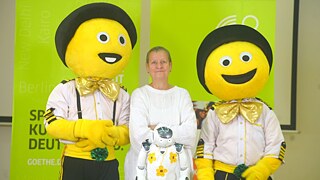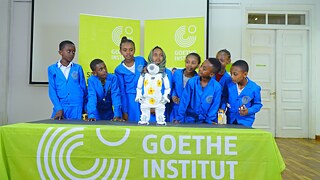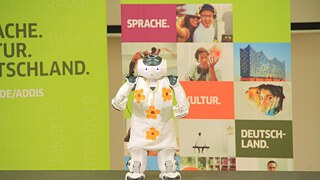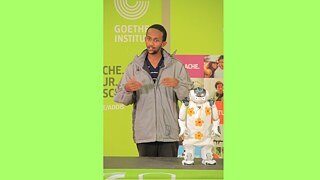ROBOT IN RESIDENCE IN ETHIOPIA

Robot in Residence in Ethiopia
Our journey with the NAO - robot
The project aimed to promote cultural diversity by using robots and AI. Our journey with the NAO project began when I (Beleir Messay) learned about the open call for coders and artists. The opportunity to work on cutting-edge technology and contribute to innovative cultural initiatives immediately caught my attention. With a background in software engineering as a second-year student at Addis Ababa University, I felt compelled to apply and explore this unique opportunity. I called my friend Estifanos and asked if he would be interested, and not surprisingly, he was.
Upon acceptance, I received an email, and soon after that email, I started reading different books on NAO. After almost a week, I was able to grasp some understanding of the NAO.
Our initial encounters with the NAO robot were awe-inspiring. Throughout the project, we played a multifaceted role. Our primary responsibilities included programming the NAO robot to narrate cultural stories interactively and perform traditional dances. These tasks were challenging yet immensely rewarding. They required meticulous attention to detail. One of the noteworthy challenges was ensuring that the robot's movements and interactions were not only technically precise but also emotionally engaging.
This took many tries, several failures, and some useful criticism. This makes us really get started doing good work on it. But movement alone wasn’t enough to express the different moods that the characters were experiencing, so then came the idea to add some LEDs to the mix and see how it worked, and doing so got some very positive outputs.
The climax of the project was the grand ending ceremony, where the NAO robot came to life as a cultural storyteller and dancer. Presenting the stories interactively to an audience of approximately 50 students from various schools was a rewarding experience. The highlight of the ceremony was the robot's performance of a traditional Ethiopian New Year song (Abebayehosh), which is celebrated in September, accompanied by a dance. The fusion of technology and culture was met with applause and appreciation from the attendees. Witnessing the impact of our work on the audience was a gratifying moment.
And that was what the journey was like, special thanks to Goethe-Insitut Äthiopien.
Beleir Messay
The project aimed to promote cultural diversity by using robots and AI. Our journey with the NAO project began when I (Beleir Messay) learned about the open call for coders and artists. The opportunity to work on cutting-edge technology and contribute to innovative cultural initiatives immediately caught my attention. With a background in software engineering as a second-year student at Addis Ababa University, I felt compelled to apply and explore this unique opportunity. I called my friend Estifanos and asked if he would be interested, and not surprisingly, he was.
Upon acceptance, I received an email, and soon after that email, I started reading different books on NAO. After almost a week, I was able to grasp some understanding of the NAO.
Our initial encounters with the NAO robot were awe-inspiring. Throughout the project, we played a multifaceted role. Our primary responsibilities included programming the NAO robot to narrate cultural stories interactively and perform traditional dances. These tasks were challenging yet immensely rewarding. They required meticulous attention to detail. One of the noteworthy challenges was ensuring that the robot's movements and interactions were not only technically precise but also emotionally engaging.
This took many tries, several failures, and some useful criticism. This makes us really get started doing good work on it. But movement alone wasn’t enough to express the different moods that the characters were experiencing, so then came the idea to add some LEDs to the mix and see how it worked, and doing so got some very positive outputs.
The climax of the project was the grand ending ceremony, where the NAO robot came to life as a cultural storyteller and dancer. Presenting the stories interactively to an audience of approximately 50 students from various schools was a rewarding experience. The highlight of the ceremony was the robot's performance of a traditional Ethiopian New Year song (Abebayehosh), which is celebrated in September, accompanied by a dance. The fusion of technology and culture was met with applause and appreciation from the attendees. Witnessing the impact of our work on the audience was a gratifying moment.
And that was what the journey was like, special thanks to Goethe-Insitut Äthiopien.
Beleir Messay
-

-

-

-
